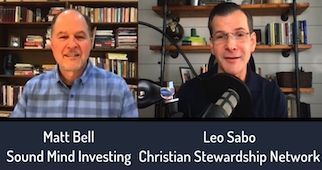
Being a disciple of Jesus Christ has implications for how we use and manage money. "If you have not been trustworthy in handling worldly wealth," Jesus asks in Luke 16:11, "who will trust you with true riches?"
He goes on to say, "No one can serve two masters. Either you will hate the one and love the other, or you will be devoted to the one and despise the other. You cannot serve both God and money."
The message is clear: We must be trustworthy with money while resisting the temptation to elevate money (and the things it can buy) to a god-like level. Put another way, we should regard money as a helpful and necessary tool but not as a master.
Because learning to be wise and faithful with money is crucial for Christian discipleship, local churches should regularly teach about money management, including investing. (SMI’s Multiply small-group study can help!)
Leo Sabo, the founder of the Christian Stewardship Network, spoke recently with SMI’s managing editor Matt Bell about investing-related education in the local church. An edited transcript of part of their discussion is below.
(A video of the entire conversation is on Vimeo. An audio version is here.)
Transcript
Leo Sabo:
Is the church responsible, and is there an opportunity here, for the church to help people gain wisdom in the [particular financial] area of investing?
Matt Bell:
I think the answer is yes to both. The church, I believe, does have a responsibility here, and I believe it has a huge opportunity — because so many people, and especially younger people, have been drawn into investing [during the pandemic].... One of the things I want to really camp on is, "What can we control?" [because we can’t control what the market and the economy do].
We can control how much we set aside for investing, and we can take this step-by-step approach that — y’know, I love the simple framework that we give as our first priority, we save as our second priority, we then invest a portion. If somebody did that — it’s so simple and yet so rare — if they gave the first portion, if they saved the next portion, if they invested the next portion, and then built their lifestyle with what remains.
That’s a simple, biblical goal framework for investing that the church would do wonders by teaching and fostering and encouraging in people.
And then, I think the hardest work of an investor is the emotional side of it. You know, it’s both ends of the spectrum. It’s the greed on the one side and it’s the fear on the other side. And social media — and the things in the culture that we’ve seen during the pandemic — are all about fostering greed. So obviously the Bible speaks a lot about [greed]. And then the fear piece is equally, if not more important. When the market goes down, that’s when people tend to get scared and they tend to sell their investments. And so here too, just some really practical education about the history of investing [is helpful].
People say, "The market has had an average annual return of 10%." Well, that’s true. But what often doesn’t get explained is that that journey was not a straight, smooth journey! And so you’ve gotta be emotionally and spiritually prepared for those ups and downs, which comes back to [the need for a trustworthy] process.
So, if you do something as simple as [choose an appropriate] stock-bond allocation when you’re young, you can afford to take more risks because you’ve got time to ride out the ups and downs. When you get older, you’ve less time to ride out those ups and downs, so that portfolio should tilt toward safer things like bonds. If you get that piece of it right, which is something you can absolutely control, you’ve done a lot.
So, organize your budget and your lifestyle so that you can afford to invest on a regular basis. Then be patient. You know, "Steady plodding brings prosperity, hasty speculation brings poverty." (Proverbs 21:5 TLB)
And so we need to be mindful of the principles of Scripture. The Bible doesn’t talk about Roth IRAs versus traditional IRAs and ETFs versus mutual funds. But it certainly presents many principles about patience and about managing the emotional side, the fear and greed that often comes into conversations about investing.
Leo Sabo:
So where do you think that the conversation of investing fits into the larger stewardship conversations? This is a thing we’re passionate about [at CSN]. It’s our passion that churches would equip and that they would teach people how to be good stewards, how to be generous and build God’s kingdom. So how does investing fit into that?
Matt Bell:
I think it’s an integral part of the stewardship conversation. And I’ve been involved in stewardship long enough to be, honestly, a little bit frustrated at the idea that it seems like stewardship ministries, even today — I feel like it’s probably fair, unfortunately, to say that most people availing themselves of the offerings of a typical stewardship ministry are either in trouble financially, because they’ve got lots of debt, or [they are involved in] the conversation in the church around generosity. And those are two really important topics. Generosity is, obviously, hugely important. Helping people live free from the bondage of debt is hugely important. But that’s not the whole story.
Investing is one of the integral parts of the whole — the framework of: we give generously off the first portion, we save a portion, we invest a portion.
And yes, some of it is for our later years. So for some younger people that might seem kind of boring that, "Oh, I’m waiting for my later years." But it’s not great stewardship to hit retirement age now dependent on Social Security or others because we haven’t been wise. And so when you’re young — time is one of the most valuable assets a young person has — and to put time to work in that compounding process means that you can invest a lot less now than if you wake up when you’re 40 or 50 and realize you haven’t been investing and now I’ve got a lot of catching up to do. So it’s really important to take advantage of an asset that you’ve got when you’re young, which is time.
Leo Sabo:
I’m with you. I wish we could move beyond the "training wheels" — because not only does that create this wrong notion that the stewardship ministry is either for people who are broke or in debt, who need financial assistance or need the education to get out of their bad situation, or it’s all about giving. And it sells short everything else that God is trying to teach and do through our lives in the area of stewardship. Stewardship is more than money is more than giving. Stewardship is how we live our lives.
So what are some of the key principles that Christians should be mindful of as they invest? Can we touch on that?
Matt Bell:
Sure. And before we do, I just wanna camp on one other point, and that is the church’s opportunity here. I think there’s a huge opportunity within this topic of investing to draw many people into the stewardship conversation, into the offerings of the stewardship ministry, because there is so much interest in it. To find out that the Bible has principles that are relevant and helpful [in a practical area like investing], may be surprising to some people. And so I think it’s an opportunity to really expand the reach and impact of a ministry.
In terms of principles, the Bible talks about diversification from Ecclesiastes. So, people talk about individual stocks — "I’m gonna go all-in on GameStop" or on AMC theaters — and that’s not diversified. So that’s why we at SMI really value the [inherent] diversification of mutual funds and exchange-traded funds.
[Scripture also supports the idea of taking a long-term view], that slow and steady process where we’re thinking long-term, where we realize that the market moves in cycles [and] that it shouldn’t be a shock when the market goes through a downturn, when there’s a correction, when there’s a bear market. These things happen. The overall broad trajectory of the market has been upward — but again, it’s been marked by lots of ups and downs along the way. And so that "steady plodding" sort of mindset and approach to investing is really essential to invest successfully.
As I mentioned, managing our emotions, fear and greed. One of the things that was so encouraging to me is that we surveyed our members at SMI after the big downturn of early 2020 to ask them, "Did you make any changes? How did you navigate that scary time?" Even most experienced investors can be nervous when the market is falling so fast, so quickly, so far, and there’s so much fear and uncertainty around the pandemic.
And yet so many people wrote to us — we asked them about certain scriptures that were helpful to them. We have a resource on our website that we make available to people with all these verses that people sent us. It was so encouraging to see God’s people leaning on the truth of God’s Word, that God is "our rock and our salvation," that God is "our provider," that God has promised to provide for our needs — He knows our needs.
And that I think is one of the most perhaps understated principles as Christians, that it’s our faith — that’s our foundation. It’s not the size of our 401(k) account. It’s not the size of our IRA. It’s our faith in Christ that is the foundation of our lives. And so when those scary times as an investor [come], to have that foundation of faith is so very essential.
So those are some of the key things I would say as general principles of biblical investing.
Leo Sabo:
I love what you said, Matt, that this is an opportunity for the church because people try things that the world puts in front of them. We all have been duped to do certain things that the world says, "This is what you should do." And then when it doesn’t turn out [well] — because it won’t, it doesn’t satisfy, it doesn’t fulfill us — then the church can be there to take an opportunity to say, "Let’s show you the wisdom of God"....
Matt, I appreciate what you do, not just personally, but also what you do through Sound Mind Investing. I appreciate the guidance and the information and the wisdom you provide. So thank you for that, and thank you for your time.
Matt Bell:
Well, my pleasure, Leo — I really appreciate all that you and CSN are doing as well.







